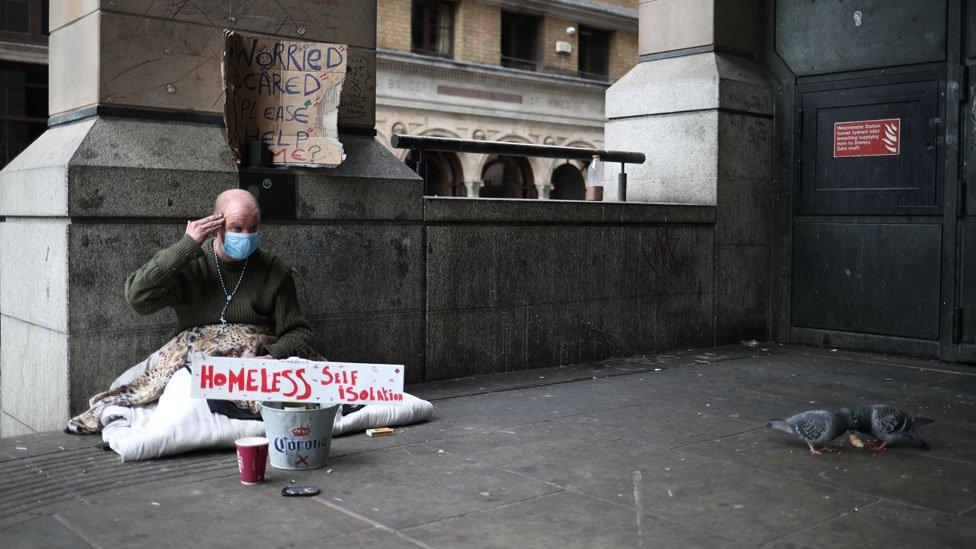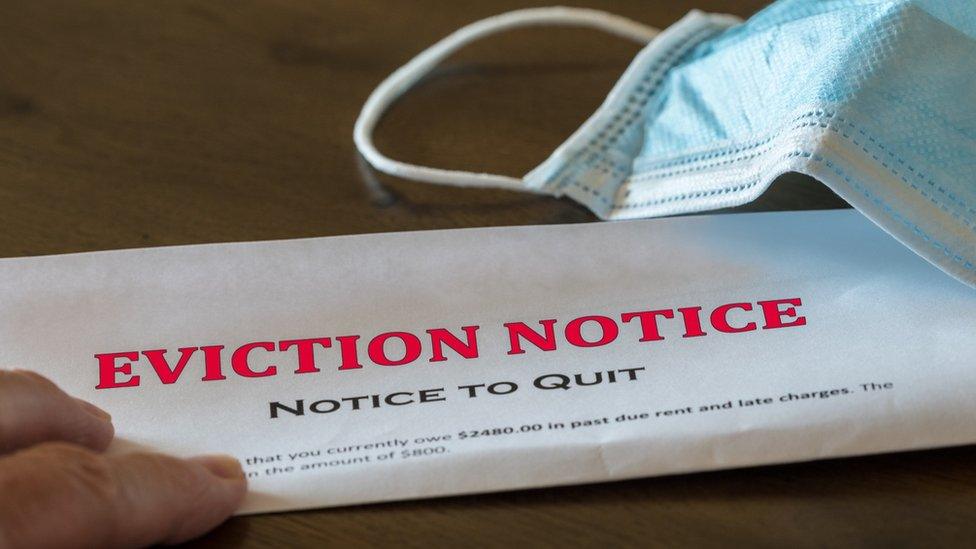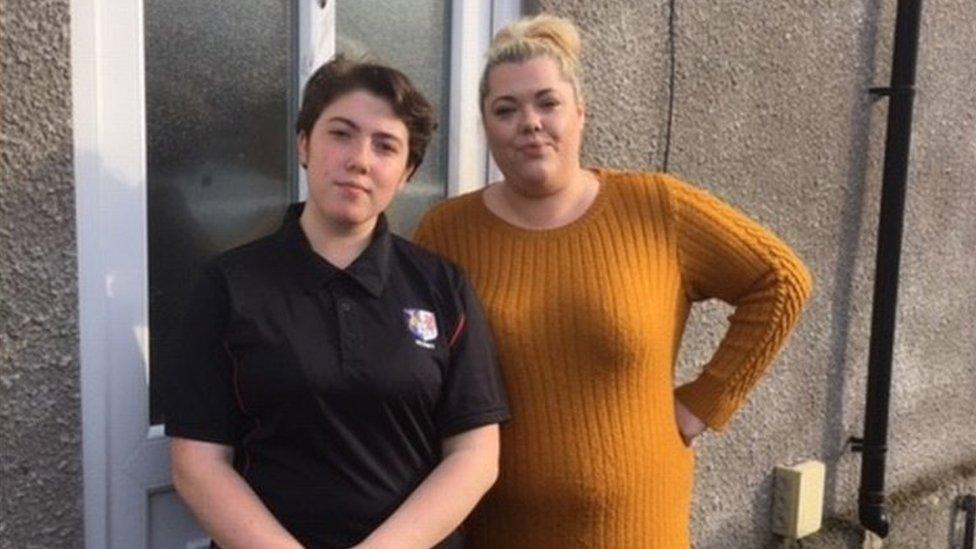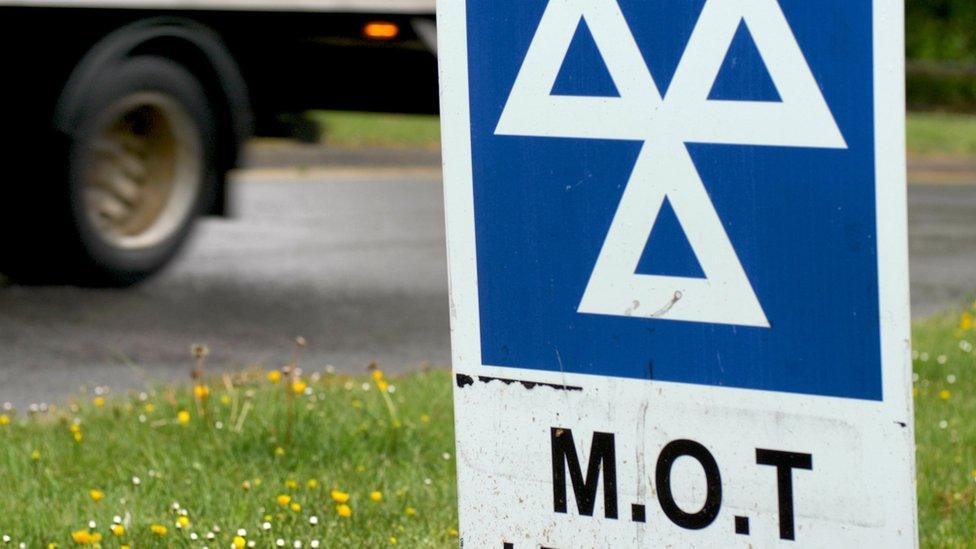Renters: Eviction bans in England and Wales are extended
- Published
- comments

Eviction bans in England and Wales have been extended, following a similar move in Scotland on Thursday.
The move will mean eviction notices - which could have started again on Monday - will not be served for six weeks in England and longer in Wales.
Current restrictions were due to end on Monday, but charities have called for more financial support for tenants.
Councils are also being given extra funding to house rough sleepers during the cold winter months.
They will be asked to go back to people on the streets who had previously refused help, given the rising Covid infection rates.
Renter support
In the last month, bailiffs have been unable to serve notices and enforce evictions in England and Wales, dubbed a Christmas truce.
Evictions were banned at the start of the first lockdown in March - and ministers extended the notice period landlords must give from three to six months.
Courts began to clear the backlog of repossession cases in September, starting with the most serious cases such as those involving domestic violence or anti-social behaviour.
With some of those set to come through, charities and opposition parties have been calling for an extension to the bailiff ban, given the stricter restrictions and greater threat of Covid transmission.
Housing is a devolved issue. In Scotland, the ban on eviction orders, which was due to expire on 22 January, was extended to the end of March on Thursday. This will apply to all evictions in areas subject to level three or four restrictions, except in cases of serious anti-social behaviour, including domestic abuse.
Now, in Wales, plans have been announced to extend its ban to the end of March with ministers saying this "is an extremely difficult time for many people and renters should not be forced out of their homes".
Also on Friday, Housing Minister Robert Jenrick announced the bailiff ban will be extended to 21 February in England.

He said that councils would also be given £10m to "redouble their efforts" to accommodate rough sleepers.
"At the start of this pandemic we made sure that the most vulnerable in society were protected. This winter, we are continuing in this vein and redoubling our efforts to help those most in need," he said.
"Our ongoing 'Everyone In' initiative is widely regarded as one of the most successful of its kind in the world, ensuring 33,000 people are safe in accommodation. We are now going further and focusing on GP registration of rough sleepers."
He said this was aimed at ensuring that rough sleepers did not miss out on Covid vaccines.
'I'm scared about a letter'
Concerns about homelessness and crowded accommodation have risen during the Covid crisis. Half a million private tenants in the UK are behind with their rent, according to research by Citizens Advice.
It said this was a new problem for many of them, suggesting 58% were not in arrears last February, before the pandemic hit people's jobs and finances.
The charity said that those who had fallen behind on rent owed at average of £730.
It was among a collection of charities calling for financial support for renters, pointing out that homeowners had seen the benefit of mortgage holidays.

One student told Citizens Advice that he was in a state of constant worry over the threat of eviction.
He was unable to supplement his student loan with work, as he had previously, and benefits failed to fill the gap. His letting agent declined his request for a temporary rent reduction.
"I've no idea what might happen, and that's the scary thing. Every day I'm waiting for a letter to say that he [the landlord] wants to sell the place, or change the tenancy or something like that," he said.
"It's always in the back of my mind that you're going to get home and there's an [eviction] letter."
The UK government has announced that, from next month, tenants and landlords may be able to use a mediation service to iron out disputes and keep people in their homes.
Thangam Debbonaire, Labour's shadow housing secretary, said the UK government's response was "not good enough".
"The virus is more rampant than ever before, yet the government action does not measure up to what was done in March," she said.
Landlords' worries
Landlords groups have also called on the UK government for financial support in England.
They point out that many people who let out a home do not have a large portfolio of properties, and would also have faced the threat of income loss of redundancy from regular jobs.
However, the National Residential Landlords Association said ministers were "doing more harm than good" by "repeatedly banning repossessions" as this simply stacked up more tenant debt on top of their existing arrears.
"The repossessions ban is a sticking plaster that will ultimately lead to more people losing their homes," said the association's chief executive Ben Beadle.
"Instead the government should recognise the crisis facing many tenants and take immediate action to enable them to pay their debts as is happening in Scotland and Wales. The objective should be to sustain tenancies in the long term and not just the short term."
In Northern Ireland, landlords are required to give tenants 12 weeks' notice to quit, before moving to eviction proceedings. The rules were extended to March in anticipation of the second wave of the pandemic.
- Published8 January 2021

- Published15 October 2020

- Published18 December 2020

- Published6 January 2021
